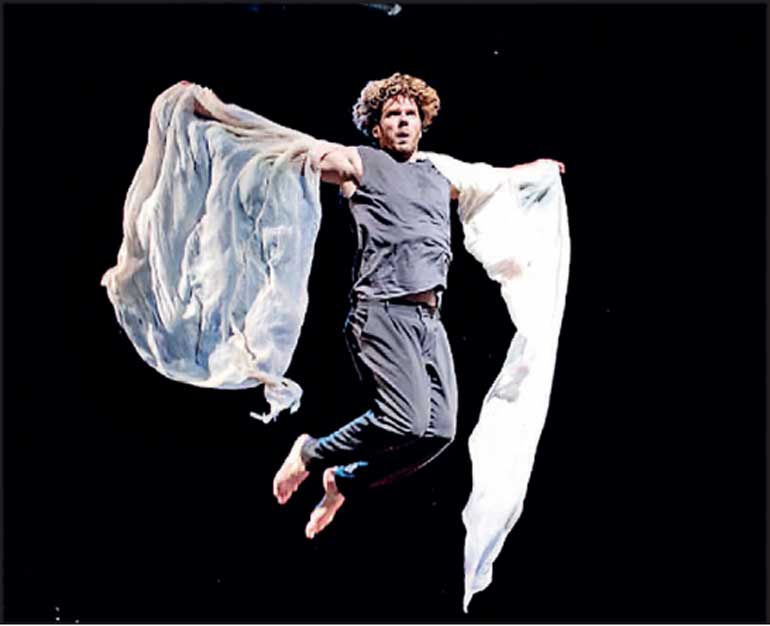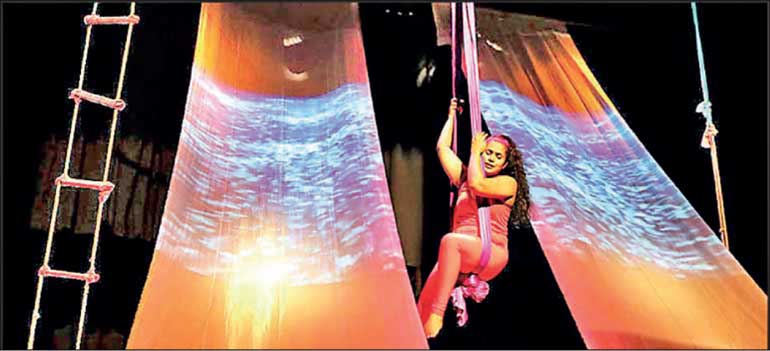Thursday Feb 19, 2026
Thursday Feb 19, 2026
Saturday, 24 August 2024 00:10 - - {{hitsCtrl.values.hits}}

Nijinsky
Love and Lockdown
Graced by Chief Guest Sissy Papathanassiou, Historian, Author, Director, and Founder and President of the Analogio International Festival I Greek Institute for Drama, Theatre, Arts & the Letters, as well as the head of the Letters Directorate, Hellenic Republic Ministry of Culture in Greece, the Colombo Theatre Festival, the brainchild of M. Safeer, commences today.
(https://www.ft.lk/harmony_page/International-theatre-to-take-the-stage-in-Sri-Lanka/10523-765087)
The festival will felicitate the late Jayalath S. Gomes who has contributed immensely to the translation of theatre scripts.
We feature below briefly some of the story lines of the theatrical productions on stage from today onwards till 29 August at the Elphinstone theatre. For details, also visit www.citf.lk.
Opening show
Love and Lockdown
M. Safeer – Sri Lanka
The festival’s opening show is Love and Lockdown directed by M. Safeer.
Love and Lockdown is themed around what happens when the sentiments of love collides with solitude when experienced either willingly or unwillingly. Although based in the background of the COVID-19 lockdown saga, his creation is not about the pandemic, but a theatrical creation about an inseparable link between the heart and the parameters of solitude and juxtaposes it with the concept of loneliness. The central figure who feels these sentiments and struggles within its confines is a young woman. Through movement, dance, singing and acting her experiences of solitude, loneliness, separation from dear ones, dreams, pains, pleasure, love, lust, are converted to a production of staged art with minimum usage of words.
25th
A story for Eurydice
Luisa Guarro – Italy
Eurydice, in love with Orpheus, is dead. She ended up under a car because she didn’t pay attention to the road and she didn’t pay attention because she was trying to escape from her ex-boyfriend Aristeo, who was armed with a knife. Her entire life passes before her and in this dilated time she reconstructs her story through fragments of memory. The fragments of her memory tell of a young woman from a provincial town in southern Italy, a beautiful and lively “nymph” who loved to dance, but who was repressed by her community. Only at the end of her telling does Eurydice realise that she is the spirit of a dead body, lying on a morgue table as she crosses the threshold of the afterlife.
Nijinsky
Mălina Andrei – Romania
The story compresses essential moments from the 200 pages diary written by an artist caught between creation and despair; the famous dancer and choreographer Vaslav Nijinsky. Born in Kiev in 1889, he was one of the most important artists of the 20th century and one of the world’s greatest dancers, who revolutionised classical ballet through unconventional forms of expression. In this performance, Nijinsky is portrayed in the moment when he was at the border line between normality and insanity. Sensing the imminent loss of touch with reality, Nijinsky makes a desperate effort to convey his message to the world, by writing fiercely for two months in an attempt to save both himself and his creation from oblivion. Using different methods of expression, the performance convey as much as possible from what this complex personality meant, not only to the dance history but also to the human history.
Meri Muniya
Dr. Vidhu Khare Das – India
This is the story of a poor farmer who works hard to get his daughter educated. He wants to make her an influential officer. Muniya is the name of his daughter. Muniya’s mother dies at her birth. The dying wife asks for a promise from her husband that Muniya will receive a good education to achieve this. The man works hard and Muniya reaches high school. The proud father shares his happiness to his community. One day the girl goes missing and the dead body is found. The father runs from pillar to post get the justice for his daughter. The story revolves around the helplessness of the underprivileged and their shattered dreams.
26th
Ala
Mohammad Kazemtabar – Iraq
This drama revolves around Ala, an Iraqi girl who fled to Iran as a teenager and meets a boy named Arash in Iran and marries him. With the start of the war between Iran and Iraq, Arash goes to war as a nurse. Ala also goes to the war front to find Arash and takes care of the Iranian wounded. One day as Ala is taking care of the wounded, the field hospital is bombed. Arash goes to the heart of the desert to find help, but he ends up in Iraq...
Gigolo
Devang Tewari – India
Charming. Intelligent. Murderer. Psychopath! A saint or a sinner? This show documents the thrilling journey of Murli, a runaway kid from rural India, who became one of the country’s most notorious and wanted criminals.
Gigolo is the astonishing story of an ordinary Indian boy who worked as a labourer and background dancer in Hindi films who traded in sex, and then became a psychopath, killing more than 17 people.
‘Never seen before; Must watch’ (Times of India)
‘Breathtaking performance’ (Hindustan)
I want to fly like a kite – Flatform Performance
Nehal Bhattacharjee – India
This story depicts Child Oppression. It is said children had a desire to feel the air, the beautiful earth, and its surroundings. Moreover, they dream to fly high up like a kite. They are free birds who had wings to go anywhere their inner calling takes. But, still today it is very prevalent that on the eve of post modernisation somewhere it is seen that children are being limited and restricted.
27th
Katabaza
Dominik Setlak – Porland
The starting point for creating “Katabaza” was the methodology of Transmedia in matters of the theme of automythologisation. The performance, in its formula, is a synthesis of various artistic disciplines but also people and artistic perspectives. Katabaza is based on narratives of growth and the relationship that the author of the text had with his grandfather. The perspective of maturing, self-discovery, and familial connections serve as a starting point for reflection on the functioning of personality in our social spaces.
My Mother’s Diaries
Amitai Kedar – Israel
I am my mother’s only son. On the day of my mother’s funeral, I found in a shoebox with her life’s diaries. Next to them, I found a letter. For 25 years I have kept the diaries with me. I can’t let them go—they are asking me to bring them to life.
The play illuminates my childhood relationship with a mother who lived in two distinct and parallel worlds: our shared reality and the world of fantasy – a world of anguish and illusion, saturated with false delusions.
She is Naked
Fr. Peter Hemapriya Botejue – Sri Lanka
Law should be equal for all. But that is not so as this storyline shows. The law applies in one way to the rulers and another way to the helpless. This drama enacts how the law is subject to the masculinity of those who have the power and those who implement it and how society witness the nakedness of the law.
28th
Salma Deewani
Bhagyashree Tarke – India
Salma Deewani is a light-hearted take on life and a narrative placed in a one-day scenario. One Sunday morning, when Salma’s children are already awake and out to play she is disturbed by the milk man. This triggers the part of her that is struggling with life without her husband being around and kick starts a rollercoaster of banter, bickering and frustration revealing her love for a Bollywood star and other nonsense narrating her story from childhood to now, until a phone call from her husband who’s in the Gulf.
Palunko’s Wife
Iva Peter-Dragan – Croatia
This drama tells the story of Palunko’ s wife, a well-known character from a fairytale titled Fisherman Palunko and his Wife by world famous storyteller Ivana Brlić Mažuranić.
The wife does not have a name. She never got one. That namelessnes is fascinating because she is the main character in this story. Yet, her namelessness symbolises that of many other women throughout history. The nameless Palunko’s wife does not talk at all and her red nose is hidden on her face but beneath her apron is a leotard and she is a master of heights and tames even wild animals.
Wawula
Anuruddha Heenatigala – Sri Lanka
Based on the emergence of a new political culture with the stabilisation of the Walauva family, the drama revolves around the tragic fate of the old left-wing movement and the new left groupings. The storyline therefore reflects a societal new evolution.
29th
Aamar Aami
Ashim Das – Bangladesh
“Amar Ami” is a historically influenced play inspired by a historical character, Binodini Dasi, one of the finest and pioneering actresses of Bengal. Srimati Binodini Dasi was born during 1863 AD at 145 Kornwalis Street of then Calcutta who started acting at the age of 11-12 but ended her career as an actress on 1 January, 1887 at the peak of her fame.
Mt. Rushmore
Theresa Buchheister and Nehemiah Lucket – USA
Mt. Rushmore is a punk rock, time travel voyage that flings audiences into the throes of the rebellious fringes of the Reagan era in California, where they are tasked with helping playwright and performer Monica Hunken on her quest to save her own mother from a lifetime of grief and Conservatism. This is a true 1980s action adventure - packed to the brim with espionage, unexpected friendships, and even a shot at redemption. Mt. Rushmore features original songs and punk rock classics.
A forgotten tale
Satish Kumar – India
Ashwathama, son of revered warrior Guru Drona, faced tragedy during the Mahabharata. Misled by the Pandavas about his son’s death, Guru Drona, in shock, met his demise on the battlefield. Seeking vengeance, Ashwathama aimed to end the Pandava bloodline but was cursed by Lord Krishna. Millennia later, he wanders, cursed to bleed eternally, stripped of power and humanity. The questions persist: Can Ashwathama, once a blessed warrior, fulfil his ultimate goal of avenging his father’s death? Or will centuries of suffering weigh him down, condemning him to unending torment?
A River’s Tale
Dr. Mrinal Jyoti Goswami
“A River’s Tale,” based on Priyanka Das’s poem “Lakheitorai Dhuwa Daag” is a mono-drama that explores the profound relationship between a woman and the river Lakheitra. Through the expressive art of Bhortal Dance of Assam, it portrays her struggle against societal oppression and violence. The narrative sheds light on the harsh realities faced by women, their search for solace, and the tragic outcomes, including suicide.